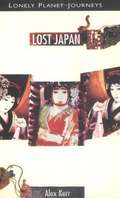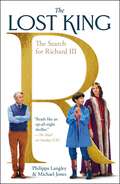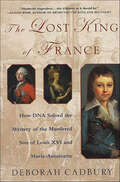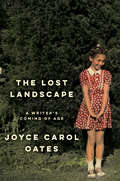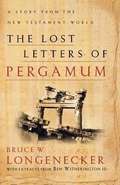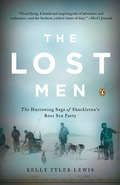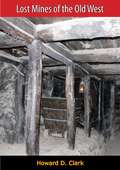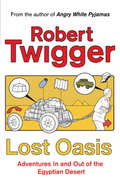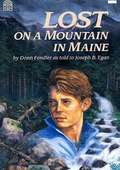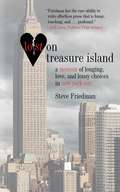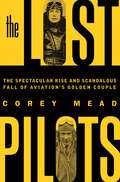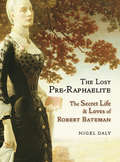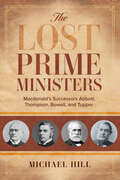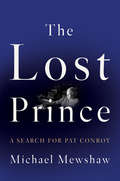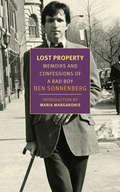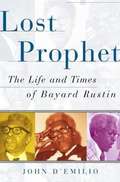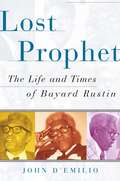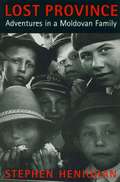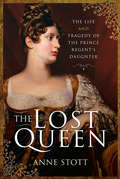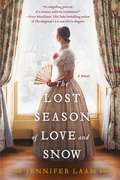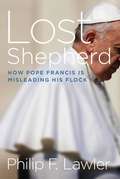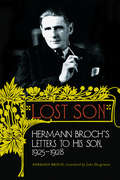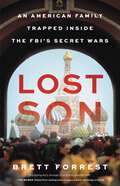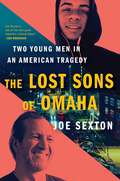- Table View
- List View
Lost Japan
by Alex KerrDrawing on the author's personal experiences of Japan over a period of over 30 years, this book takes its readers on a backstage tour, exploring different facets of the author's involvement with the country. The Japanese edition of this book was awarded the 1994 Shincho Gakugei Literature Prize.
The Lost King: The Search for Richard III
by Philippa Langley Michael JonesThe official inside story of the discovery of the bones of Richard III now a major motion picture starring Sally Hawkins and Steve Coogan The mystery of who Richard III really was has fascinated historians, readers and audiences familiar with Shakespeare's dastardly portrait of a hunchbacked monster of royalty for centuries. In 2012, the remains of a man with a curving spine, who possibly was killed in battle, were discovered underneath the paving of a parking lot in Leicester, England. Phillipa Langley, head of The Richard III Society, spurred on by the work of the historian Michael Jones, led the team of who uncovered the remains, certain that she had found the bones of the monarch. When DNA verification later confirmed that the skeleton was, indeed, that of King Richard III, the discovery ranks among the great stories of passionate intuition and perseverance against the odds.The news of the discovery of Richard's remains has been widely reported by the British as well as worldwide and was front page news for both the New York Times and The Washington Post. Many believe that now, with King Richard III's skeleton in hand, historians will finally begin to understand what happened to him following the Battle of Bosworth Field (twenty miles or so from Leicester) and, ultimately, to know whether he was the hateful, unscrupulous monarch of Shakespeare's drama or a much more benevolent king interested in the common man. Written in alternating chapters, with Richard's 15th century life told by historian Michael Jones (author of the critically acclaimed Bosworth - 1485) contrasting with the 21st century eyewitness account of the search and discovery of the body by Philippa Langley, The Lost King will be both an extraordinary portrait of the last Plantagenet monarch and the inspiring story of the archaeological dig that finally brings the real King Richard III into the light of day.
The Lost King of France: How DNA Solved the Mystery of the Murdered Son of Louis XVI and Marie-Antoinette
by Deborah CadburyRoyalty, revolution, and scientific mystery---the dramatic true account of the fate of Louis XVII, son of Marie Antoinette, and an extraordinary detective story that spans more than two hundred years.Louis-Charles, Duc de Normandie, enjoyed a charmed early childhood in the gilded palace of Versailles. At the age of four, he became the dauphin, heir to the most powerful throne in Europe. Yet within five years he was to lose everything. Drawn into the horror of the French Revolution, his family was incarcerated and their fate thrust into the hands of the revolutionaries who wished to destroy the monarchy.In 1793, when Marie Antoinette was beheaded at the guillotine, she left her adored eight-year-old son imprisoned in the Temple Tower. Far from inheriting a throne, the orphaned boy-king had to endure the hostility and abuse of a nation. Two years later, the revolutionary leaders declared Louis XVII dead. No grave was dug, no monument built to mark his passing.Immediately, rumors spread that the prince had, in fact, escaped from prison and was still alive. Others believed that he had been murdered, his heart cut out and preserved as a relic. As with the tragedies of England's princes in the Tower and the Romanov archduchess Anastasia, countless "brothers" soon approached Louis-Charles's older sister, Marie-Therese, who survived the revolution. They claimed not only the dauphin's name, but also his inheritance. Several "princes" were plausible, but which, if any, was the real heir to the French throne?The Lost King of France is a moving and dramatic tale that interweaves a pivotal moment in France's history with a compelling detective story that involves pretenders to the crown, royalist plots and palace intrigue, bizarre legal battles, and modern science. The quest for the truth continued into the twenty-first century, when, thanks to DNA testing, the strange odyssey of a stolen heart found within the royal tombs brought an exciting conclusion to the two-hundred-year-old mystery of the lost king of France.
The Lost Landscape
by Joyce Carol OatesA momentous memoir of childhood and adolescence from one of our finest and most beloved writers, as we've never seen her beforeIn The Lost Landscape, Joyce Carol Oates vividly re-creates the early years of her life in western New York State, powerfully evoking the romance of childhood and the way it colors everything that comes after. From early memories of her relatives to remembrances of a particularly poignant friendship with a red hen, from her first friendships to her first experiences with death, The Lost Landscape is an arresting account of the ways in which Oates's life (and her life as a writer) was shaped by early childhood and how her later work was influenced by a hardscrabble rural upbringing.In this exceptionally candid, moving, and richly reflective recounting of her early years, Oates explores the world through the eyes of her younger self and reveals her nascent experiences of wanting to tell stories about the world and the people she meets. If Alice in Wonderland was the book that changed a young Joyce forever and inspired her to look at life as offering end-less adventures, she describes just as unforgettably the harsh lessons of growing up on a farm. With searing detail and an acutely perceptive eye, Oates renders her memories and emotions with exquisite precision to truly transport the reader to a bygone place and time, to the lost landscape of the writer's past but also to the lost landscapes of our own earliest, and most essential, lives.
The Lost Letters of Pergamum: A Story from the New Testament World
by Bruce W. Longenecker Ben Witherington"The Lost Letters of Pergamum" introduces readers to the style of New Testament writings and the social and political world of Jesus and his first followers. Using the literary technique of correspondence through ancient letters, Longenecker mixes fact and fiction to paint an interesting and informative picture of the New Testament world and early Christianity.
The Lost Men
by Tyler-Lewis KellyIn 1914, Sir Ernest Shackleton sailed south aboard the Endurance to be the first to cross Antarctica. Shackleton's endeavor is legend, but few know the astonishing story of the Ross Sea party, the support crew he dispatched to the opposite side of the continent to build a vital lifeline of food and fuel depots. When the Ross Sea ship, the Aurora, broke free of her moorings and disappeared in a gale in 1915, she left ten men stranded on the continent with only the clothes on their backs and little hope of rescue. Against all odds, the men decided to go forward with their mission, sledging 1,700 miles in a record-setting two-year odyssey. They never imagined that their immense sacrifice was futile -- for Shackleton never set foot on the continent, and the Endurance lay crushed at the bottom of the Weddell Sea. Inexperienced and poorly equipped, the men of the Ross Sea party endured the unspeakable suffering of malnutrition, hypothermia, and extreme weather conditions with fortitude. With their personal journals and previously unpublished documents, Kelly Tyler-Lewis brings us close to these men in their best and bleakest times and revives for us their heroic, astounding story of survival in the most hostile environment on earth.
Lost Mines of the Old West
by Howard D. Clark Ray HetheringtonAUTHENTIC STORY OF THE “PEGLEG” AND 21 OTHER STORIES OF FABULOUS LOST MINES!Author Howard D. Clark, a Kansas native, had an extensive career in journalism with appointments including managing editor for the Farm Press Publications of Chicago, Illinois; staff writer for a number of business papers; and statistical and analytical specialist for other periodicals and concerns.This background, plus extensive travel on the Pacific Coast, fitted him particularly well to undertake the writing of this book. Lost mine legends make up a large section of Western folklore. In this collection he has made a sincere effort to present only the most important and best authenticated of them all. He has also had the invaluable assistance of Ray Hetherington, an unquestioned authority in the field of Western Americana. Much of the source material used herein was collected by Mr. Hetherington through thirty years of extensive research.First published in 1946, this collection of lost mine legends is considered among the most complete and factual of any ever assembled.
Lost Oasis: In Search Of Paradise
by Robert TwiggerBestselling author of ANGRY WHITE PYJAMAS, BIG SNAKE and VOYAGEUR enters into the desert in search of a lost oasis'Last night my son wanted to appease me because of some annoyance he had caused. "Show me your desert things," he said, "show me your crystals and stones." However tired and grumpy I might be, he knew how to revive me. I unwrapped everything from its newspaper roll. The chipped flint knives, the silica glass arrowheads, ancient porous pottery shards I'd found in the Gilf, fossils, the jawbone of a gazelle, palm nuts so desiccated they were like stone . . .'Robert Twigger's latest journey is in search of paradise: a desert adventure in the footsteps of seasoned explorers such as Theodore Almasy (the Inspiration for THE ENGLISH PATIENT) who tried to locate the lost oasis of Zezura, reportedly home to hoards of treasure, flocks of birds and a lush, verdant valley.The Egyptian Sahara is one of the most arid and hostile environments on earth. But it is also a wonder of desolate beauty, where in the ultra-clear light of the desert you can see for miles.Armed with plenty of water and a homemade wooden trolley (his Lada being too heavy for the sand), Twigger embarks on a desert trip ilke no other . . .
Lost Oasis: In Search Of Paradise
by Robert TwiggerBestselling author of ANGRY WHITE PYJAMAS, BIG SNAKE and VOYAGEUR enters into the desert in search of a lost oasis'Last night my son wanted to appease me because of some annoyance he had caused. "Show me your desert things," he said, "show me your crystals and stones." However tired and grumpy I might be, he knew how to revive me. I unwrapped everything from its newspaper roll. The chipped flint knives, the silica glass arrowheads, ancient porous pottery shards I'd found in the Gilf, fossils, the jawbone of a gazelle, palm nuts so desiccated they were like stone . . .'Robert Twigger's latest journey is in search of paradise: a desert adventure in the footsteps of seasoned explorers such as Theodore Almasy (the Inspiration for THE ENGLISH PATIENT) who tried to locate the lost oasis of Zezura, reportedly home to hoards of treasure, flocks of birds and a lush, verdant valley.The Egyptian Sahara is one of the most arid and hostile environments on earth. But it is also a wonder of desolate beauty, where in the ultra-clear light of the desert you can see for miles.Armed with plenty of water and a homemade wooden trolley (his Lada being too heavy for the sand), Twigger embarks on a desert trip ilke no other . . .
Lost on a Mountain in Maine
by Donn FendlerA twelve-year-old describes his nine-day struggles to survive after being separated from his companions in the mountains of Maine in 1939.
Lost on Treasure Island: A Memoir of Longing, Love, and Lousy Choices in New York City
by Steve FriedmanWhen Midwesterner Steve Friedman arrived in Manhattan, the land of the quick and the mean, raring to go and ready to conquer, he soon found pitfalls and pratfalls more numerous and perilous than he had ever imagined. Here is his utterly honest, often hilarious, self-deprecating account of those fateful years, starting with his first job at GQ and his awkward efforts to impress his boss, Art Cooper, and including real and imagined love affairs, disasters at work and play, growing self-awareness with its inevitable bouts of depression and subsequent therapies-all of which fail-and in the end, a wisdom that promises better things to come. In the tradition of Bright Lights, Big City and The Devil Wears Prada, Lost on Treasure Island is a witty rendition of the perils of growing up and being thrown into the real world. With sharp humor and unexpected sincerity, Friedman crafts a inviting portrait of the best of times and the worst of times. For all those who have confronted the endless opportunities of the Big Apple, only to discover how hard it is to succeed in this-or any-big city, this boisterous and often enlightening memoir will prove irresistible.
The Lost Pilots: The Spectacular Rise and Scandalous Fall of Aviation's Golden Couple
by Corey MeadCorey Mead's The Lost Pilots is the saga of two star crossed pilots who soar to the greatest heights of fame, tailspin into scandal and crime, and go the ultimate lengths for a chance at redemption...During the height of the roaring twenties, Jessie Miller longs for adventure. Fleeing a passionless marriage in the backwaters of Australia, twenty-three-year-old Jessie arrives in London and promptly falls in with the Bright Young Things, those gin-soaked boho-chic intellectuals draped in suits, flapper dresses, and pearls. At a party Jessie meets Captain William Lancaster, married himself and fresh from the Royal Air Force, with a scheme in his head to become as famous as Charles Lindbergh, who has just crossed the Atlantic. Lancaster will do Lindy one better: fly from London to Melbourne, and in Jessie Miller he’s found the perfect co-pilot.Within months the two embark on a half-year journey across the globe, hopping from one colonial outpost to the next. But like world records, marriage vows can be broken, and upon their landing in Melbourne Jessie and William are not only international celebrities, but also deeply inlove.Yet the crash of 1929 catches up to even the fastest aviator, and the couple finds themselves in dire straits at their rented house on the outskirts of Miami – the bright glare of the limelight fading quickly.To make ends meet Jessie agrees to write a memoir, and picks the dashing Haden Clarke to be her ghostwriter. It’s not long before this toxic mix of bootleg booze and a handsome interloper leads to a shocking crime, a trial that rivets and scandalizes the world, and a reckless act of abandon to win back former glory.The Lost Pilots is an extraordinary true story, brought to vivid life by Corey Mead. Based on years of research, and full of adventure, forbidden passion, crime, scandal and tragedy, it is a masterwork of narrative nonfiction that firmly restores one of aviation’s leading female pioneers to her rightful place in history.
The Lost Pre-Raphaelite
by Nigel DalyWhen the author bought a falling down fortified house on the Staffordshire moorlands, he had no reason to anticipate the astonishing tale that would unfold as it was restored. A mysterious set of relationships emerged amongst its former owners, revolving round the almost forgotten artist, Robert Bateman, a prominent Pre-Raphaelite and friend of Burne Jones. He was to marry the granddaughter of the Earl of Carlisle, and to be associated with Benjamin Disraeli, William Gladstone, and other prominent political and artistic figures.But he had abandoned his life as an artist in mid-career to live as a recluse, and his rich and glamorous wife-to-be had married the local vicar, already in his sixties and shortly to die. The discovery of two clearly autobiographical paintings led to an utterly absorbing forensic investigation into Bateman's life.The story moves from Staffordshire to Lahore, to Canada, Wyoming, and then, via Buffalo Bill, to Peru and back to England. It leads to the improbable respectability of Imperial Tobacco in Bristol, and then, less respectably, to a car park in Stoke-on-Trent. En route the author pieces together an astonishing and deeply moving story of love and loss, of art and politics, of morality and hypocrisy, of family secrets concealed but never quite completely obscured. The result is a page-turning combination of detective story and tale of human frailty, endeavor, and love. It is also a portrait of a significant artist, a reassessment of whose work is long overdue.Nigel Daly is an antique dealer and house restorer.
The Lost Prime Ministers: Macdonald's Successors Abbott, Thompson, Bowell, and Tupper
by Michael HillAfter John A. Macdonald’s death, four Tory prime ministers — each remarkable but all little known — rose to power and fell in just five years. From 1891 to 1896, between John A. Macdonald’s and Wilfrid Laurier’s tenures, four lesser-known men took on the mantle of leadership. Tory prime ministers John Abbott, John Thompson, Mackenzie Bowell, and Charles Tupper headed the government of Canada in rapid succession. Each came to the job with qualifications and limitations, and each left after unexpectedly short terms. Yet these reluctant prime ministers are an important part of our political legacy. Their roles were much more than caretakers between the administrations of two great leaders. Personal tragedy, terrible health issues, backstabbing, and political manipulation all led to their eventual downfalls. The Lost Prime Ministers is the dramatic saga of these overlooked Canadian leaders.
The Lost Prince: A Search for Pat Conroy
by Michael Mewshaw&“In The Lost Prince Michael Mewshaw sets down one of the most gripping stories of friendship I&’ve ever read.&” —Daniel Menaker, author of My Mistake: A MemoirPat Conroy was America&’s poet laureate of family dysfunction. A larger–than–life character and the author of such classics as The Prince of Tides and The Great Santini, Conroy was remembered by everybody for his energy, his exuberance, and his self–lacerating humor.Michael Mewshaw&’s The Lost Prince is an intimate memoir of his friendship with Pat Conroy, one that involves their families and those days in Rome when they were both young—when Conroy went from being a popular regional writer to an international bestseller. Family snapshots beautifully illustrate that time. Shortly before his forty–ninth birthday, Conroy telephoned Mewshaw to ask a terrible favor. With great reluctance, Mewshaw did as he was asked—and never saw Pat Conroy again.Although they never managed to reconcile their differences completely, Conroy later urged Mewshaw to write about &“me and you and what happened . . . i know it would cause much pain to both of us. but here is what that story has that none of your others have.&” The Lost Prince is Mewshaw&’s fulfillment of a promise.
Lost Property: Memoirs and Confessions of a Bad Boy
by Ben SonnenbergA smart and hilarious memoir of privilege and excess told by the son of a powerful, seductive member of the New York elite.Ben Sonnenberg grew up in the great house on Gramercy Park in New York City that his father, the inventor of modern public relations and the owner of a fine collection of art, built to celebrate his rise from the poverty of the Jewish Lower East Side to a life of riches and power. His son could have what he wanted, except perhaps what he wanted most: to get away.Lost Property, a book of memoirs and confessions, is a tale of youthful riot and rebellion. Sonnenberg recounts his aesthetic, sexual, and political education, and a sometimes absurd flight into &“anarchy and sabotage,&” in which he reports to both the CIA and East German intelligence during the Cold War and, cultivating a dandy&’s nonchalance, pursues a life of sexual adventure in 1960s London and New York. The cast of characters includes Orson Welles, Glenn Gould, and Sylvia Plath; among the subjects are marriage, children, infidelity, debt, divorce, literature, and multiple sclerosis. The end is surprisingly happy.
Lost Prophet: The Life and Times of Bayard Rustin
by John D’emilioBayard Rustin is one of the most important figures in the history of the American civil rights movement. Before Martin Luther King, before Malcolm X, Bayard Rustin was working to bring the cause to the forefront of America's consciousness. A teacher to King, an international apostle of peace, and the organizer of the famous 1963 March on Washington, he brought Gandhi's philosophy of nonviolence to America and helped launch the civil rights movement. Nonetheless, Rustin has been largely erased by history, in part because he was an African American homosexual. Acclaimed historian John D'Emilio tells the full and remarkable story of Rustin's intertwined lives: his pioneering and public person and his oblique and stigmatized private self. It was in the tumultuous 1930s that Bayard Rustin came of age, getting his first lessons in politics through the Communist Party and the unrest of the Great Depression. A Quaker and a radical pacifist, he went to prison for refusing to serve in World War II, only to suffer a sexual scandal. His mentor, the great pacifist A. J. Muste, wrote to him, "You were capable of making the 'mistake' of thinking that you could be the leader in a revolution...at the same time that you were a weakling in an extreme degree and engaged in practices for which there was no justification." Freed from prison after the war, Rustin threw himself into the early campaigns of the civil rights and anti-nuclear movements until an arrest for sodomy nearly destroyed his career. Many close colleagues and friends abandoned him. For years after, Rustin assumed a less public role even though his influence was everywhere. Rustin mentored a young and inexperienced Martin Luther King in the use of nonviolence. He planned strategy for the Southern Christian Leadership Conference until Congressman Adam Clayton Powell threatened to spread a rumor that King and Rustin were lovers. Not until Rustin's crowning achievement as the organizer of the 1963 March on Washington would he finally emerge from the shadows that homophobia cast over his career. Rustin remained until his death in 1987 committed to the causes of world peace, racial equality, and economic justice. Based on more than a decade of archival research and interviews with dozens of surviving friends and colleagues of Rustin's, Lost Prophet is a triumph. Rustin emerges as a hero of the black freedom struggle and a singularly important figure in the lost gay history of the mid-twentieth century. John D'Emilio's compelling narrative rescues a forgotten figure and brings alive a time of great hope and great tragedy in the not-so-distant past.
Lost Prophet: The Life and Times of Bayard Rustin
by John D'EmilioBayard Rustin is one of the most important figures in the history of the American civil rights movement. Before Martin Luther King, before Malcolm X, Bayard Rustin was working to bring the cause to the forefront of America's consciousness. A teacher to King, an international apostle of peace, and the organizer of the famous 1963 March on Washington, he brought Gandhi's philosophy of nonviolence to America and helped launch the civil rights movement. Nonetheless, Rustin has been largely erased by history, in part because he was an African American homosexual. Acclaimed historian John D'Emilio tells the full and remarkable story of Rustin's intertwined lives: his pioneering and public person and his oblique and stigmatized private self.It was in the tumultuous 1930s that Bayard Rustin came of age, getting his first lessons in politics through the Communist Party and the unrest of the Great Depression. A Quaker and a radical pacifist, he went to prison for refusing to serve in World War II, only to suffer a sexual scandal. His mentor, the great pacifist A. J. Muste, wrote to him, "You were capable of making the 'mistake' of thinking that you could be the leader in a revolution...at the same time that you were a weakling in an extreme degree and engaged in practices for which there was no justification." Freed from prison after the war, Rustin threw himself into the early campaigns of the civil rights and anti-nuclear movements until an arrest for sodomy nearly destroyed his career. Many close colleagues and friends abandoned him. For years after, Rustin assumed a less public role even though his influence was everywhere. Rustin mentored a young and inexperienced Martin Luther King in the use of nonviolence. He planned strategy for the Southern Christian Leadership Conference until Congressman Adam Clayton Powell threatened to spread a rumor that King and Rustin were lovers. Not until Rustin's crowning achievement as the organizer of the 1963 March on Washington would he finally emerge from the shadows that homophobia cast over his career. Rustin remained until his death in 1987 committed to the causes of world peace, racial equality, and economic justice.Based on more than a decade of archival research and interviews with dozens of surviving friends and colleagues of Rustin's, Lost Prophet is a triumph. Rustin emerges as a hero of the black freedom struggle and a singularly important figure in the lost gay history of the mid-twentieth century. John D'Emilio's compelling narrative rescues a forgotten figure and brings alive a time of great hope and great tragedy in the not-so-distant past.
Lost Province: Adventures in a Moldovan Family
by Stephen HenighanStephen Henighan, a Romanian grammar book and hours of language tapes under his belt, billets with a family as an English teacher in Moldova, a country born from the dismantling of Romania during World War II. <P><P>As a Westerner in this "lost province" and former Soviet republic, Henighan feels he’s an unnerving disappointment for many Moldovans, especially to the MTV-addicted, twenty-year-old Andrei.
The Lost Queen: The Life and Tragedy of the Prince Regent's Daughter
by Anne M. StottA look at the tragically short life of the only daughter of Britain’s King George IV who won the heart of a nation.As the only child of the Prince Regent and Caroline of Brunswick, Princess Charlotte of Wales (1796-1817) was the heiress presumptive to the throne. Her parents’ marriage had already broken up by the time she was born. She had a difficult childhood and a turbulent adolescence, but she was popular with the public, who looked to her to restore the good name of the monarchy. When she broke off her engagement to a Dutch prince, her father put her under virtual imprisonment, and she endured a period of profound unhappiness. But she held out for the freedom to choose her husband, and when she married Prince Leopold of Saxe-Coburg, she finally achieved contentment. Her happiness was cruelly cut short when she died in childbirth at the age of twenty-one, only eighteen months later. A shocked nation went into mourning for its “people’s princess,” the queen who never was.“This perspicacious study of Charlotte’s short life is superb. Anne Stott is an accomplished and highly readable biographer whose earlier subjects have included William Wilberforce and Hannah More. She wears her research lightly—which is not to say that the book is anything less than scholastic (quite the opposite). Highly recommended.” —Naomi Clifford, author of The Murder of Mary Ashford
The Lost Season of Love and Snow: A Novel
by Jennifer Laam"A captivating tale in which Natalya Pushkin is vividly imagined. [A] sensitive and skillfully written novel... sure to enchant." - Hazel Gaynor, New York Times bestselling author of The Girl Who Came HomeThe unforgettable story of Alexander Pushkin’s beautiful wife, Natalya, a woman much admired at Court, and how she became reviled as the villain of St. Petersburg.At the beguiling age of sixteen, Natalya Goncharova is stunningly beautiful and intellectually curious. At her first public ball during the Christmas of 1828, she attracts the romantic attention of Russia’s most lauded rebel poet: Alexander Pushkin. Finding herself deeply attracted to Alexander’s intensity and joie de vivre, Natalya is swept up in a courtship and then a marriage full of passion but also destructive jealousies. When vicious court gossip leads Alexander to defend his honor as well as Natalya’s in a duel, he tragically succumbs to his injuries. Natalya finds herself reviled for her perceived role in his death. In her striking new novel, The Lost Season of Love and Snow, Jennifer Laam helps bring Natalya’s side of the story to life with vivid imagination—the compelling tale of her inner struggle to create a fulfilling life despite the dangerous intrigues of a glamorous imperial Court and that of her greatest love.
Lost Shepherd: How Pope Francis Is Misleading His Flock
by Philip F. LawlerFaithful Catholics are beginning to realize it’s not their imagination. <P><P> Pope Francis has led them on a journey from joy to unease to alarm and even a sense of betrayal. They can no longer pretend that he represents merely a change of emphasis in papal teaching. Assessing the confusion sown by this pontificate, Lost Shepherd explains what’s at stake, what’s not at stake, and how loyal believers should respond.
Lost Son: Hermann Broch's Letters to His Son, 1925-1928
by Hermann BrochBy any measure, Hermann Broch was one of the greatest writers of the twentieth century. Author of The Sleepwalkers and The Spell, he stands, together with James Joyce and Marcel Proust, at the pinnacle of literary Modernism. Born in 1886, he saw the First World War destroy the culture and consciousness of what had come before, seeing the West thrust unwillingly into the modern age. By 1938 Broch found himself arrested and detained, during which time be began work on his greatest novel, The Death of Virgil. Dozens of friends from all over the world managed to help him find his release and he moved to the United States where he lived for the rest of his life.With his wife Franziska, Broch had only a single child, Armand. While Broch had become preoccupied with deep questions of philosophy, psychology, and politics, his son became a thoroughgoing materialist. Sent away to an elite boarding school when 14, Armand found himself surrounded by students from the richest families in Europe. He became devoted to sports, to fast luxury cars (his father did not even know how to drive), and to the first class lifestyle of his classmates. These letters show the profound breach that developed between father and son. They also provide a portrait of the Gilded Age, a time of remarkable change, as Europe headed on a course of horrible inevitability. Letters from Broch during this time are uncommon, so we also get a chance to follow the trajectory of his life as he prepares to leave his job as an industrialist and devote himself to study and to writing.
Lost Son: An American Family Trapped Inside the FBI’s Secret War
by Brett ForrestA young American lost in Russia. An FBI-cover up. A mystery leading from Washington to the heart of the Kremlin's war in Ukraine. When Billy Reilly vanished, his parents embarked on a desperate search for answers. Was their son&’s disappearance connected to his mysterious work for the FBI, or was it a personal quest gone wrong? Only when Wall Street Journal reporter Brett Forrest embarks on his own investigation does a picture emerge: of the FBI's exploitation of US citizens through a secretive intelligence program, a young man's lust for adventure within the world's conflicts, and the costs of a rising clash between Moscow and Washington.Sept. 11th roused Billy Reilly's curiosity for religions, war, and the world and its people beyond his small town near Detroit. Online, Billy taught himself Arabic and Russian. His passions led him into jihadi Internet forums, attracting the interest of the FBI.An amateur drawn into professional intelligence, Billy became a Confidential Human Source, one of thousands of civilians who assist FBI agents with investigative work, often at great hazard and with little recourse. When Russia stirred rebellion in Ukraine, Billy set out to make his mark.In Russia, Billy's communications dropped. His parents, frantic, asked the FBI for help but struggled to find answers. Grasping for clues, the Reilly family turned to Brett Forrest. Commencing a quest of his own, Forrest applied years' worth of research, along with decades of extensive experience in Russia, illuminating the inner workings of the national-security machine that enmeshed Billy and his family, picking up the lost son's trail.A masterwork of reporting, composed like a thriller, blending political maneuvering and international espionage, Lost Son illustrates one man's coming of age amid new global dangers.
The Lost Sons of Omaha: Two Young Men in an American Tragedy
by Joe SextonFrom the award–winning journalist Bob Woodward calls "one of the truly great reporters working today," a searing, no-holds-barred account of two linked and tragic deaths stemming from the 2020 George Floyd protests that explores the complex political and racial mistrust and division of today&’s America.&“A monumental study of violence and grief...one of the most superb testaments about the confusion, despair, and—hopefully—humility that frames our century that one could ever hope to read." —Hilton AlsOn May 30, 2020, in Omaha, Nebraska, amid the protests that rocked our nation after George Floyd&’s death at the hands of police, thirty-eight-year-old white bar owner and Marine veteran Jake Gardner fatally shot James Scurlock, a twenty-two-year-old Black protestor and young father. What followed were two investigations of Scurlock&’s death, one conducted by the white district attorney Don Kleine, who concluded that Gardner had legally acted in self-defense and released him without a trial, and a second grand jury inquiry conducted by African American special prosecutor Fred Franklin that indicted Gardner for manslaughter and demanded he face trial. Days after the indictment, Gardner killed himself with a single bullet to the head. The deaths of both Scurlock and Gardner gave rise to a toxic brew of misinformation, false claims, and competing political agendas. The two men, each with their own complicated backgrounds, were turned into grotesque caricatures. The twin tragedies amounted to an ugly and heartbreaking reflection of a painfully divided country. Here, Joe Sexton masterfully unpacks the whole twisting, nearly unbelievable chronicle into a meticulously reported and nuanced account of the two deaths, explaining which claims were true and which distorted or simply false. The Lost Sons of Omaha involves some of the most pressing issues facing America today, including our country&’s dire need for gun control and mental health reform; the dangerous spread of fake news, particularly on social media; and the urgent call to band together in the collective pursuit of truth, fairness, and healing. &“A bracing, rigorously reported story—told with grace and nuance—that takes readers deep into the fault lines of today&’s America.&” —Andrea Elliott, Pulitzer Prize-winning author of Invisible Child
